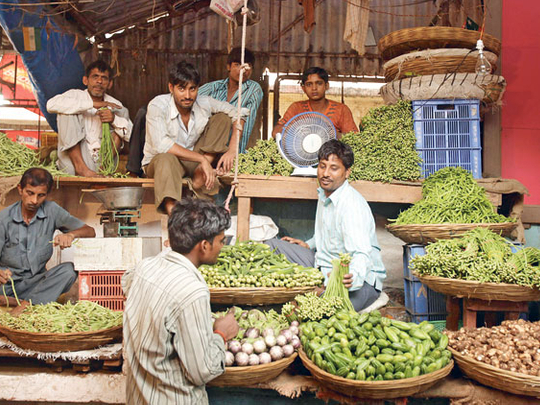
New Delhi: In mid-July the Gujarat Cooperative Milk Marketing Federation, an Indian dairy-products maker, raised milk prices in New Delhi by as much as Rs2 a litre, to almost Rs30 (Dh2.30).
The increase has a real impact on the city's poor, who scrape by on as little as $2 (Dh7.35) a day. And the government of Prime Minister Manmohan Singh is indirectly responsible: Singh is trying to lower India's budget deficit — it's at a 16-year high — and has started to roll back $5.5 billion in subsidies for gasoline and diesel. With gas prices suddenly higher, it's a lot more expensive to run a fleet of milk trucks.
"We were left with no choice but to hike prices as transportation costs have jumped," says R.S. Sodhi, the milk co- op's chairman, Bloomberg Business Week reports in its issue due on Monday.
This should have been a good summer for Singh. The economy will probably grow more than 8.5 per cent for the year through March, faster than the 7.4 per cent for the last fiscal year. The prime minister no longer needs the two big communist parties in his coalition to pass legislation, so he can push market- friendly policies such as the elimination of fuel subsidies, which eat up 2.5 per cent of the budget.
Yet the spectre of inflation is haunting Singh's government. The benchmark wholesale price index jumped 10.5 per cent in June from the year before, after a 10.1 per cent gain in May. Consumer prices paid by industrial and farm workers in India are increasing at almost 14 per cent annually, the highest among 17 countries tracked by Bloomberg in the Asia-Pacific region.
Driving factors
In the long run, the fuel price increase will encourage companies to use energy more efficiently. For this year, though, the rise will add about a percentage point to wholesale inflation, according to the Reserve Bank of India, the central bank.
Two other factors are driving inflation. Food prices jumped after 2009's disastrous monsoon resulted in poor harvests of rice, lentils and sugar. The revival of the industrial economy has created bottlenecks in the supply chain even as the middle class buys more cars, apparel, and other goods.
"I've never seen such a time when we had to struggle so hard to make ends meet," says Shweta Kapoor, a housewife haggling over vegetables with a vendor in Faridabad township near New Delhi. "You name it, everything has become expensive."
Singh is under attack for not containing the situation.
"Why didn't you release more grains in the market to reduce the impact of the drought?" ex-central bank governor Bimal Jalan asks rhetorically in a Bloomberg interview. "We heard inflation will come down by March, then April," says Jalan, who ran the central bank between 1997 and 2003. "It was supposed to come down by now."
Emergency food stocks
The government keeps stores of grain and meat for emergencies.
"They could have done a good job making it available," says D.K. Aggarwal, chairman of New Delhi-based fund manager SMC. The opposition Bharatiya Janata Party organised a nationwide strike on July 5 when Singh reduced the fuel subsidies.
Reserve Bank of India governor Duvvuri Subbarao has reversed last year's loose money policy and raised rates three times since March, to 5.5 per cent.
"They still have more work to do," says Brian Jackson, an emerging markets strategist at Royal Bank of Canada in Hong Kong. Subbarao wants to curb prices without strangling the recovery.
Singh's government is calling on Subbarao to get tough. Montek Singh Ahluwalia, deputy chairman of the powerful Planning Commission, said recently the central bank should make "whatever adjustments it feels necessary", as inflation above 10 per cent is "not acceptable". Another rate hike is forecast when the central bank meets on Tuesday.
PM's adviser suggests rate hike
India needs to raise interest rates to curb inflation and demand, and must move away from an "accommodative" monetary policy, Chakravarthy Rangarajan, chief economic adviser to the prime minister, told reporters in New Delhi yesterday. The budget deficit in the current financial year may be lower than 5.5 per cent of gross domestic product, he said.
India's benchmark bonds declined on speculation the central bank will increase interest rates for a second time this month to combat inflation that has exceeded 10 per cent in the past five months.
Yields on 10-year securities climbed to their highest level in more than a month before the Reserve Bank of India meets on July 27. The central bank will raise the reverse-repurchase rate by a quarter of a percentage point to 4.25 per cent, according to all 18 economists surveyed by Bloomberg.
"Investors seem to be averse to taking any positions ahead of the crucial meeting," said Roy Paul, a deputy general manager at Federal Bank in Mumbai. "Some tightening is expected to curb inflation."
The yield on the 7.80 per cent note due in May 2020 rose one basis point, or 0.01 percentage point, to 7.69 per cent as of 9:24am in Mumbai, according to the central bank's trading system. That was the highest rate since June 14. The price fell 0.07, or 7 paise per Rs100 face amount.












